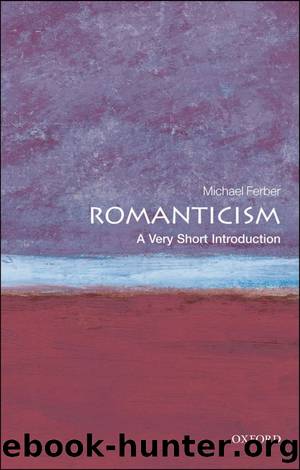Romanticism: A Very Short Introduction by Michael Ferber

Author:Michael Ferber [Ferber, Michael]
Language: eng
Format: epub
ISBN: 9780199568918
Publisher: Oxford University Press
Published: 2010-12-15T06:00:00+00:00
The sublime
Earlier we met Wordsworthâs phrase âa sense sublime / Of something far more deeply interfusedâ in his poem âTintern Abbeyâ. The idea of âthe sublimeâ gained currency in the 18th century as a category that applies both to writing â it was used to translate the ancient Greek word hypsos (âloftinessâ) in Longinusâ treatise on literary style â and to such natural objects as mountains, seas, and waterfalls, as well as to such states of mind as Wordsworthâs âsenseâ. It was often contrasted with âthe beautifulâ, which was taken as a gentle, serene, often feminine quality, appropriate to rolling hills, fertile valleys, and well-tended estates; the sublime arouses terror at the vastness and power of wild, ungovernable nature. This terror, however, is terror at a distance, where the viewer is safe enough to contemplate it rather than flee. In his Critique of the Power of Judgment (1790), Immanuel Kant named tall cliffs, towering thunder clouds, volcanoes, hurricanes, âthe boundless ocean set into a rageâ, lofty waterfalls, and the like as overwhelming compared to our puny powers.
But the sight of them only becomes all the more attractive the more fearful it is, as long as we find ourselves in safety, and we gladly call these objects sublime [German erhaben] because they elevate the strength of our soul above its usual level ⦠[and] give us the courage to measure ourselves against the apparent all-powerfulness of nature.
(tr. Guyer and Matthews)
Sublime nature calls forth the sublime in our soul. To return to our Christian triangle: after the removal of God, who was the ultimate sublime power, we rediscover his sublimity in nature, which is no longer necessarily seen as his creation, and in our own mind that responds to it. Sometimes, indeed, nature at its most sublime can seem like a mind itself, as it does in Wordsworthâs great passage about the crossing of the Alps in The Prelude (1805), where
The torrents shooting from the clear blue sky,
The rocks that muttered close upon our ears â
Black drizzling crags that spake by the wayside
As if a voice were in them â the sick sight
And giddy prospect of the raving stream,
The unfettered clouds and region of the heavens,
Tumult and peace, the darkness and the light,
Were all like workings of one mind[.]
At a comparable moment atop Mount Snowdon near the end of the poem, the scene presents âthe perfect image of a mighty Mindâ. With the same vision, Shelley cries to the steep valley of the Arve below Mont Blanc; âDizzy Ravine! And when I gaze on thee / I seem as in a trance sublime and strange / To muse on my own separate phantasy, / My own, my human mindâ (âMont Blancâ, 1817). More often, striking scenes of natural grandeur seem to speak eloquently to an attentive soul, as we saw in poems by Coleridge, Schlegel, Nerval, and others. The Russian poet Baratynsky stands before the vertiginous height of a great waterfall, âAnd my heart seems to understand / Your wordless utteranceâ (âThe Waterfallâ, 1821).
Download
This site does not store any files on its server. We only index and link to content provided by other sites. Please contact the content providers to delete copyright contents if any and email us, we'll remove relevant links or contents immediately.
Kathy Andrews Collection by Kathy Andrews(11834)
The remains of the day by Kazuo Ishiguro(9000)
Spare by Prince Harry The Duke of Sussex(5197)
Paper Towns by Green John(5191)
The Body: A Guide for Occupants by Bill Bryson(5097)
Industrial Automation from Scratch: A hands-on guide to using sensors, actuators, PLCs, HMIs, and SCADA to automate industrial processes by Olushola Akande(5061)
Machine Learning at Scale with H2O by Gregory Keys | David Whiting(4313)
Be in a Treehouse by Pete Nelson(4051)
Never by Ken Follett(3957)
Harry Potter and the Goblet Of Fire by J.K. Rowling(3858)
Goodbye Paradise(3810)
The Remains of the Day by Kazuo Ishiguro(3413)
Into Thin Air by Jon Krakauer(3399)
Fairy Tale by Stephen King(3399)
The Cellar by Natasha Preston(3344)
The Genius of Japanese Carpentry by Azby Brown(3309)
120 Days of Sodom by Marquis de Sade(3275)
Reminders of Him: A Novel by Colleen Hoover(3121)
Drawing Shortcuts: Developing Quick Drawing Skills Using Today's Technology by Leggitt Jim(3083)
